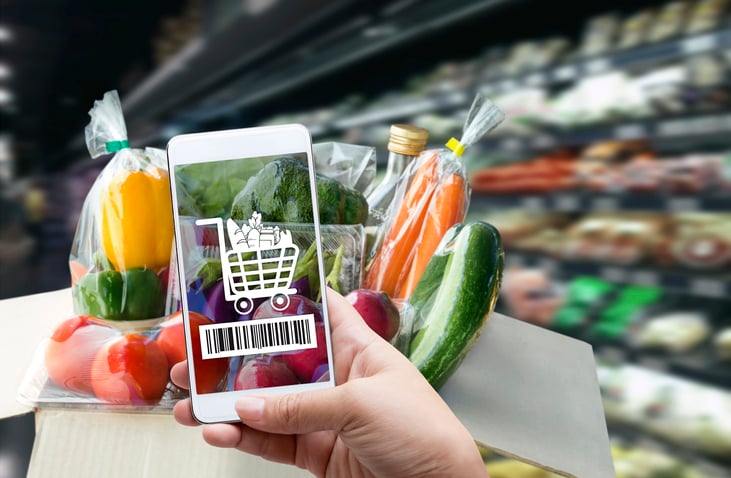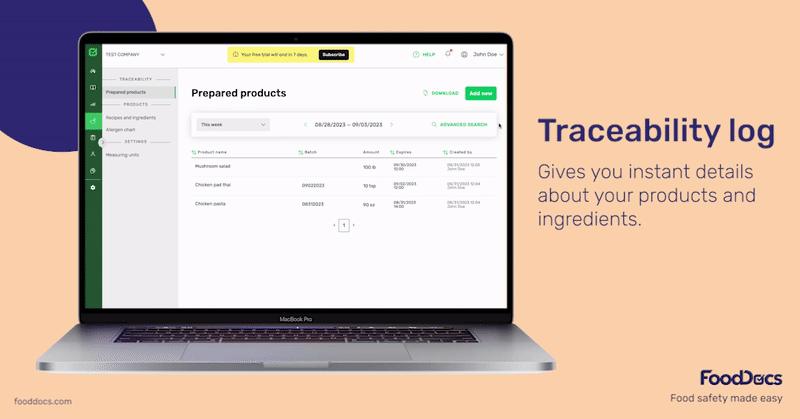Mastering Restaurant Sanitizing: Best Practices for Kitchens and Dining Areas
Master restaurant sanitizing with clear steps for kitchens and dining areas. Learn methods, checklists, and procedures to keep your team safe and...
Food traceability refers to the ability to track a food product through all stages of its production.
Its importance lies in the event of a food safety issue, where identifying the root cause of the problem becomes crucial. Many food safety certifications also require food businesses to ensure the traceability of their products.
Since the world of food safety is ever-evolving, so are the trends that surround food traceability. We set out to ask ten food traceability experts about the food traceability trends they’ve noticed in 2023 and predict what is happening in 2024.
Food traceability is essential for identifying the root cause of food safety issues and is increasingly mandated by food safety certifications.
Technological advancements such as the Internet of Things (IoT), Artificial Intelligence (AI), and Machine Learning (ML) are revolutionizing traceability in the food industry.
Blockchain technology enhances data transparency from farm to fork, improving food labeling and consumer information.
Digital food traceability systems are becoming more prevalent, providing real-time visibility and quick response capabilities during food recalls or quality issues.
Collaboration among stakeholders in the supply chain is key, with shared data platforms allowing for enhanced product tracking from farm to table.
The use of RFID and barcode systems provides consumers with easy access to detailed information about food origin, ingredients, and nutritional content.
Automation in traceability helps to eliminate human error, speeding up processes like recalls and ensuring more accurate tracking.
Consumer-facing technologies, such as QR codes and scannable labels, empower consumers with detailed product journey information, promoting transparency.
Online food ordering systems are incorporating advanced traceability technologies to meet consumer demands for safety and transparency.
Corporate and institutional catering is experiencing a push towards enhanced traceability due to increased customer demands for audits and higher standards in food safety.
CONCLUSIONS:
Let’s check out what they had to say.
"In today's food industry landscape, the focus on traceability is more crucial than ever. Tightening regulations are prompting food processors to reevaluate their supply chain and logistics practices.
One key trend we're observing is the increasing adoption of digital tools and systems, like Warehouse Management Systems (WMS), to enhance traceability.
These technologies not only provide real-time visibility into the movement of goods but also enable quicker response times in the event of recalls or quality issues.
Also, collaboration among industry stakeholders is essential. Manufacturers, processors, and distributors are working together to create more transparent supply chains. For instance, shared data platforms are emerging, allowing partners to track products from farm to table. This not only improves food safety but also strengthens consumer trust.
Additionally, we anticipate continued growth in demand for sustainable and ethical sourcing. Traceability is not just about meeting regulations — it's about meeting consumer expectations for responsible and transparent sourcing.
As we move forward, sharing knowledge and best practices among industry peers is crucial for adapting to these traceability trends. Together, we can ensure the safety and integrity of the food supply chain."
Carolyn Jackson, Director of Marketing, Infoplus Commerce

"The ability to track and trace products throughout the entire production and distribution process is critical to meeting requirements in all areas of the industry. To succeed, manufacturers need to investigate the Internet of Things, artificial intelligence and machine learning, and consumer-facing apps.
The Internet of Things (IoT) is a game changer in food traceability. Sensors, RFID tags, and other devices are being integrated into packaging and manufacturing processes to collect and transmit data. These devices can send information to a centralized system, providing valuable information that will improve traceability across the business ecosystem.
Artificial Intelligence (AI) and Machine Learning (ML) are also being used to analyze the vast amount of data available today. This data can be used to detect patterns and anomalies in the supply chain and to identify potential risks or areas for improvement. For instance, AI can predict when a batch of ingredients will expire, allowing manufacturers to prioritize their use and reduce food waste. AI and ML can also assist in new product design, optimize logistic routes, and reduce costs.
Consumer-facing apps such as QR codes and scannable labels will provide consumers with the ability to follow the path of a product from field to shelf. These platforms will enable consumers to scan QR codes on product packaging and use their smartphones to access detailed information about the product's journey from farm to table.
Consumers will also be able to learn about the sourcing of ingredients, production methods, quality control measures, and even sustainability practices.
These innovations will improve traceability to enhance transparency, benefitting all players in the food industry. Adapting to these technologies will enable manufacturers to stay competitive and meet the evolving demands of consumers for safer, more sustainable, and more transparent food products."
Steve Dombrowski, Director of Consumer Marketing, QAD
"The utilization of blockchain technology is going to have a massive effect on data transparency, creating a far more complete data capture from farm to fork. This will result in better food labeling that will better educate and inform consumers. Businesses will also benefit from more reliable and thorough reporting and auditing.
Suggestions for industry stakeholders: keep it simple and make sure that we include consumers in the dialogue.
A lot of what we talk about now is difficult to understand for someone who is not in the industry, so we need to make sure that information is concise and clear for everyone. That's why the traffic light system has been so effective for nutritional analysis."
Tarryn Gorre, Founder, Kafoodle
"Automation in regards to extracting traceability details is one of the more common trends out there.
In conjunction with that, AI used to fast track traceability is also an important upcoming trend, which can eliminate human error completely, helping recalls and withdrawals happen faster."
Nimisha Suraj, Freelance Food Safety & Hygiene Consultant and Trainer
"Many food companies are implementing RFID and barcodes on their products to provide consumers with easy access to information about the product's origin, ingredients, and nutritional content.
RFID and barcodes help in accurately tracking the movement of food products from farm to table. Each item can be assigned a unique identifier, making it easier to trace the product's origin and journey.
These systems assist in real-time inventory tracking, reducing the chances of overstocking or understocking products. This ensures that products are fresh and readily available. These systems can also provide consumers with access to product information, including the source of the food and any relevant certifications — all by simply scanning barcodes or QR codes with their smartphones."
Andre Oentoro, CEO, Breadnbeyond

"As food and beverage manufacturers wrestle with growing supply chain complexities, relying on outdated supply chain technology and manufacturing processes presents severe repercussions. These include food spoilage and write-offs, regulatory and compliance violations, and compromised consumer trust.
Given the risks associated with obsolete technology and burdensome manufacturing processes, investing in advanced supply chain systems has become imperative for the sector.
Manufacturers and brands in the industry are increasingly turning to multi-enterprise collaboration technology. These companies traditionally look to upgrade dated enterprise resource planning (ERP) or complex Advanced Planning and Scheduling (APS) systems, and many don’t realize that purpose-built operations tools or robust, real-time collaboration can unlock even more value from their investments to drive sustainability and efficiency across their supply ecosystem to:
For those managing food and beverage manufacturing supply ecosystems, investment in modern supply chain technology, especially in the realm of multi-enterprise collaboration, is no longer optional but necessary.
Outdated technology poses significant risks to food safety, compliance, and operational efficiency. By embracing technology solutions, companies can mitigate these risks and ensure the highest standards of excellence.
Real-time monitoring, end-to-end traceability, and automated compliance management safeguard both consumers and businesses, ensuring the delivery of safe, high-quality products while driving competitive advantage.
Manufacturers and suppliers who embrace multi-enterprise collaboration and technology have the unique opportunity to enhance food safety and compliance, as well as drive operational efficiency and cost savings for themselves and their trading partners. Automation of manual processes, real-time data visibility, and predictive analytics enable companies to optimize inventory management, minimize waste, and improve forecasting accuracy. Consequently, labor costs are reduced, productivity is increased, and the overall operational efficiency is enhanced."
Christine Barnhart, VP of Product Marketing and Go-to-Market, Nulogy
"The surge in demand for online food ordering necessitates robust traceability mechanisms to ensure food safety and quality.
Restaurants are integrating advanced traceability features to provide real-time insights into food sourcing, handling, and preparation.
Incorporating these new technologies and analytics allows restaurants to monitor and analyze food handling and preparation processes meticulously, ensuring compliance with stringent food safety regulations and standards.
Additionally, implementing a digital signage solution for restaurants can further enhance communication by providing real-time information on menu items, promotions, and safety measures, creating a seamless and transparent experience for customers.
Enhancing online ordering systems with advanced traceability technologies is a crucial trend, addressing the growing consumer demand for transparency and fostering a culture of accountability and safety in the food industry."
Dominik Bartoszek, Content Manager, UpMenu

"In corporate and institutional catering, we are increasingly seeing large customers not only asking for approval of traceability efforts by a government agency but also demanding an audit by a private agency that has higher requirements for obtaining certification.
The trend is clear.
The importance of sound traceability policies is increasing, driven by large companies and organizations that do not want to take risks with the health of their employees.
Traceability has become a decisive argument when choosing a caterer. "
Carl Jacobs, Co-founder and CEO, Apicbase
"As a distributor of seafood products to both white tablecloth establishments and through our e-commerce service, I foresee that there will be an increase in using sustainable methods when sourcing products. Traceability in the food industry will ensure that sustainable methods are being practiced.
Sourcing products sustainably is something that aligns with customers' requirements, as they are becoming more conscious of the environment and society.
Some of the ways for a food production company to go about implementing sustainable and ethical methods of food sourcing would be to look at local by-laws, practices in your specific industry, and general practices that you can incorporate into your business.
We currently have methods in place that adhere to sourcing seafood ethically and sustainably. We do not engage in fish farming practices and we adhere to our state’s by-laws that highlight what is not acceptable when catching lobsters. We also ensure that the traps we use are environmentally friendly and in no way affect any other wildlife in the ocean."
Joe Bowab, CEO, Lobster Anywhere
"I foresee more farm-to-table restaurants actually owned by local farms and operated by restaurants, so customers will know exactly where their food is coming from. The business can film produce being harvested at the source, create menu specials of the day containing that produce, and post the dish on social media. It shows one step traceability at its best. "
Eileen Honey Strauss, Blog Writer, Sauce
2023 was the year of increased awareness about food traceability and its importance. It was also a year of exciting technological advances in this area. Here is a summarized version of what the experts predict about this important food safety concept for 2024:
The world might be becoming more aware of food traceability’s importance only now, but we’ve always taken it seriously at FoodDocs.
Our full traceability system makes logging and accessing information about product and ingredient batches a breeze. We also offer an Advanced Search option to help you find product-related information quickly — which is super-helpful during unexpected situations. You also get:

Use FoodDocs’ helpful traceability features and food traceability template to serve safe and sustainable food to your customers.
We’re closely watching the trends surrounding food traceability and striving to keep our smart food safety management system ahead of the game.
Master restaurant sanitizing with clear steps for kitchens and dining areas. Learn methods, checklists, and procedures to keep your team safe and...
Learn challenges healthcare foodservice teams face today and key food safety practices to protect vulnerable patients. Get a free healthcare leader...
Learn what Standard Operating Procedures (SOPs) are and how to write effective SOPs that ensure consistency, efficiency, and safety in your...